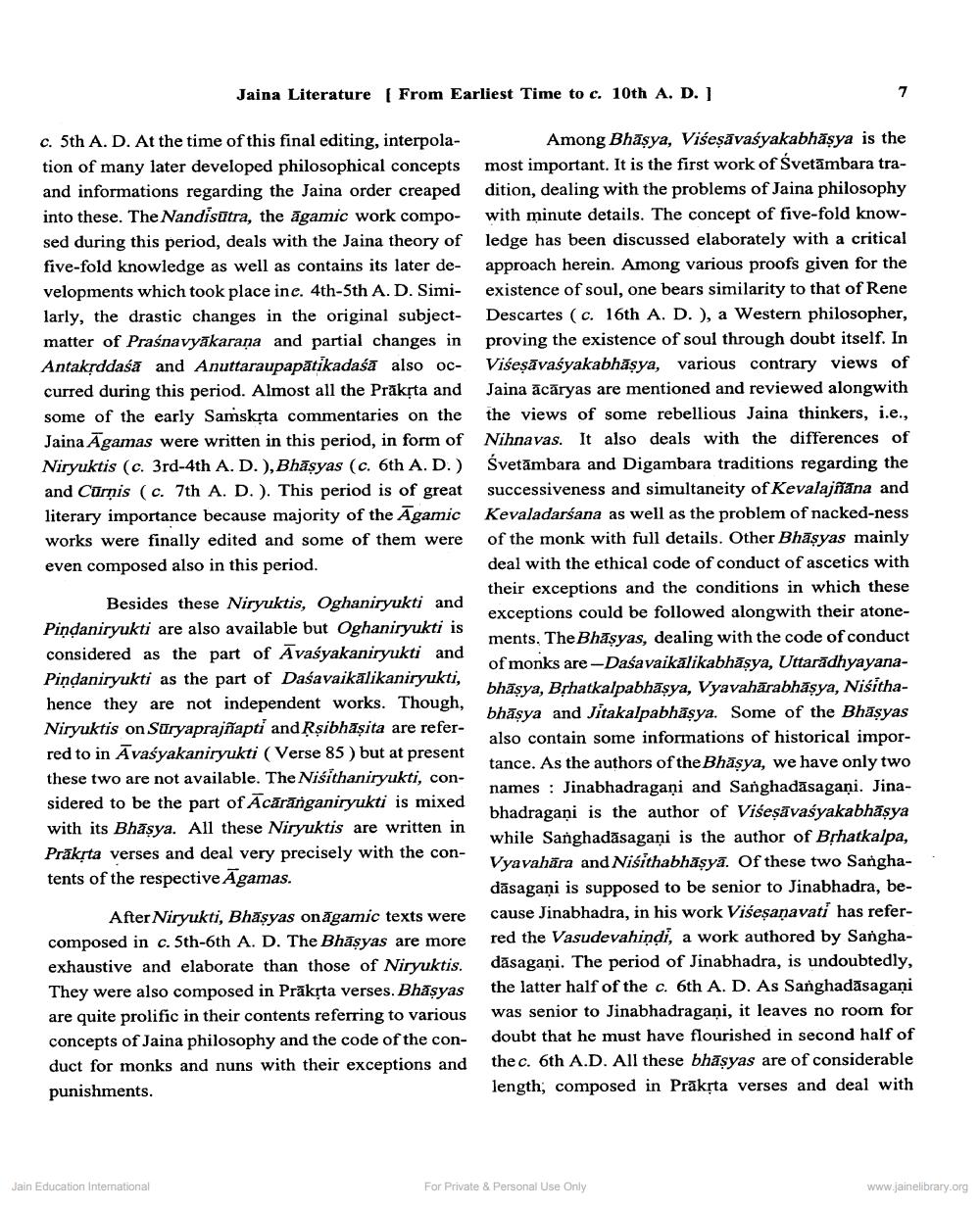________________
Jaina Literature (From Earliest Time to c. 10th A. D. ]
c. 5th A. D. At the time of this final editing, interpola
Among Bhāșya, Viseşāvaśyakabhäşya is the tion of many later developed philosophical concepts most important. It is the first work of Svetāmbara traand informations regarding the Jaina order creaped dition, dealing with the problems of Jaina philosophy into these. The Nandisūtra, the āgamic work compo- with minute details. The concept of five-fold knowsed during this period, deals with the Jaina theory of ledge has been discussed elaborately with a critical five-fold knowledge as well as contains its later de- approach herein. Among various proofs given for the velopments which took place ine. 4th-5th A. D. Simi- existence of soul, one bears similarity to that of Rene larly, the drastic changes in the original subject- Descartes (c. 16th A. D. ), a Western philosopher, matter of Praśnavyākarana and partial changes in proving the existence of soul through doubt itself. In Antakņddaśa and Anuttaraupapātikadaśa also oc- Viseşāvasyakabhāşya, various contrary views of curred during this period. Almost all the Prākta and Jaina ācāryas are mentioned and reviewed alongwith some of the early Samskrta commentaries on the the views of some rebellious Jaina thinkers, i.e., Jaina Āgamas were written in this period, in form of Nihnavas. It also deals with the differences of Niryuktis (c. 3rd-4th A. D. ),Bhāsyas (c. 6th A.D.) Svetāmbara and Digambara traditions regarding the and Cūrņis (c. 7th A. D.). This period is of great successiveness and simultaneity of Kevalajñana and literary importance because majority of the Āgamic Kevaladarśana as well as the problem of nacked-ness works were finally edited and some of them were of the monk with full details. Other Bhāşyas mainly even composed also in this period.
deal with the ethical code of conduct of ascetics with
their exceptions and the conditions in which these Besides these Niryuktis, Oghaniryukti and
exceptions could be followed alongwith their atonePindaniryukti are also available but Oghaniryukti is
ments, The Bhāşyas, dealing with the code of conduct considered as the part of Āvaśyakaniryukti and
of monks are-Daśavaikālikabhāsya, UttaradhyayanaPindaniryukti as the part of Daśavaikālikaniryukti,
bhāsya, Byhatkalpabhāsya, Vyavahārabhāsya, Niśithahence they are not independent works. Though,
bhāsya and Jitakalpabhāsya. Some of the Bhaşyas Niryuktis on Suryaprajñapti andĶşibhāșita are refer
also contain some informations of historical imporred to in Āvaśyakaniryukti (Verse 85 ) but at present
tance. As the authors of the Bhāsya, we have only two these two are not available. The Niśíthaniryukti, con
names : Jinabhadragani and Sanghadasagasi. Jinasidered to be the part of Ācāranganiryukti is mixed
bhadragani is the author of Viseșāvaśyakabhășya with its Bhāsya. All these Niryuktis are written in
while Sanghadāsagani is the author of Brhatkalpa, Prakrta verses and deal very precisely with the con
Vyavahära and Niśithabhāsyā. Of these two Sanghatents of the respective Āgamas.
dāsagani is supposed to be senior to Jinabhadra, beAfter Niryukti, Bhāsyas onāgamic texts were cause Jinabhadra, in his work Viseșanavati has refercomposed in c. 5th-6th A. D. The Bhasyas are more red the Vasudevahindi, a work authored by Sanghaexhaustive and elaborate than those of Niryuktis. dāsagani. The period of Jinabhadra, is undoubtedly, They were also composed in Prāksta verses. Bhāsyas the latter half of the c. 6th A. D. As Sanghadāsagani are quite prolific in their contents referring to various was senior to Jinabhadragani, it leaves no room for concepts of Jaina philosophy and the code of the con- doubt that he must have flourished in second half of duct for monks and nuns with their exceptions and the c. 6th A.D. All these bhāsyas are of considerable punishments.
length, composed in Prāksta verses and deal with
Jain Education International
For Private & Personal Use Only
www.jainelibrary.org




